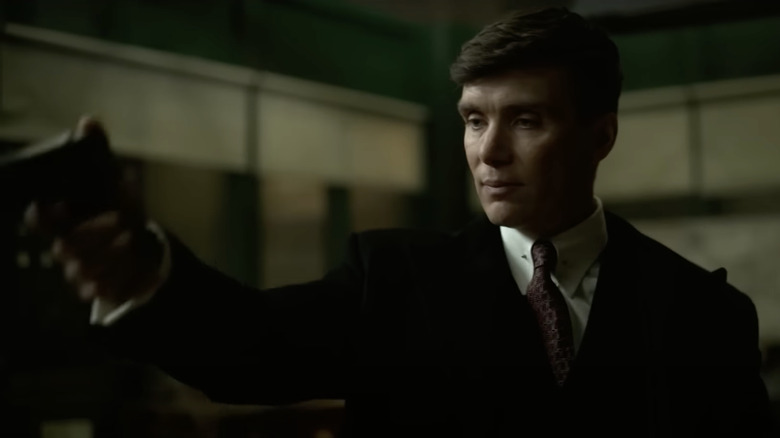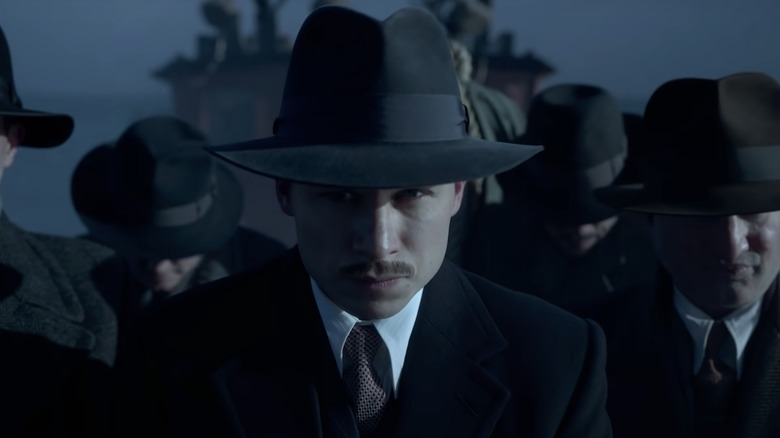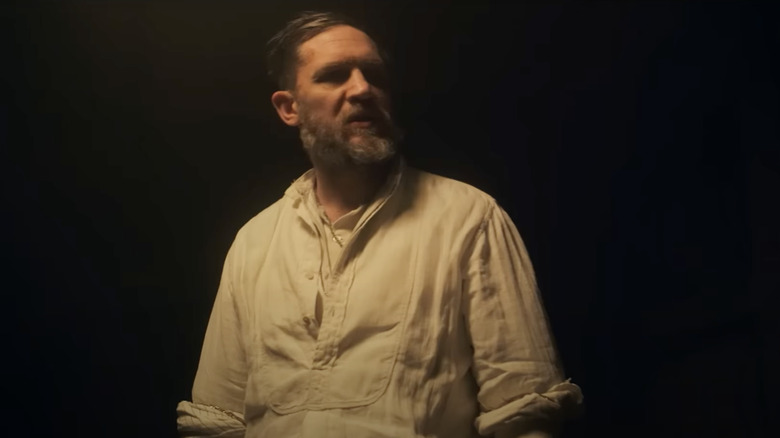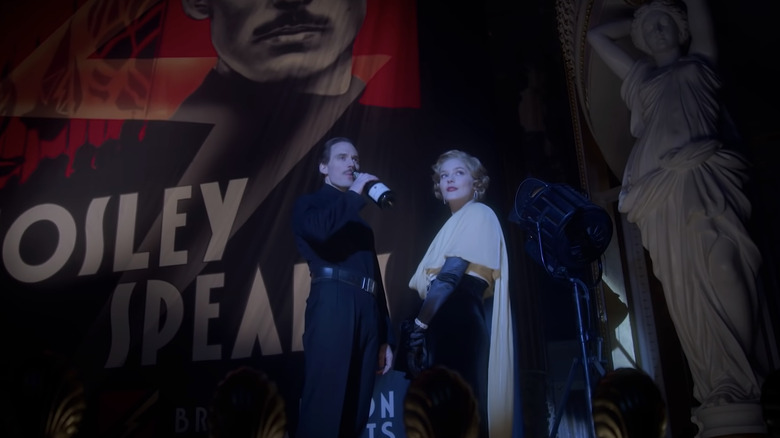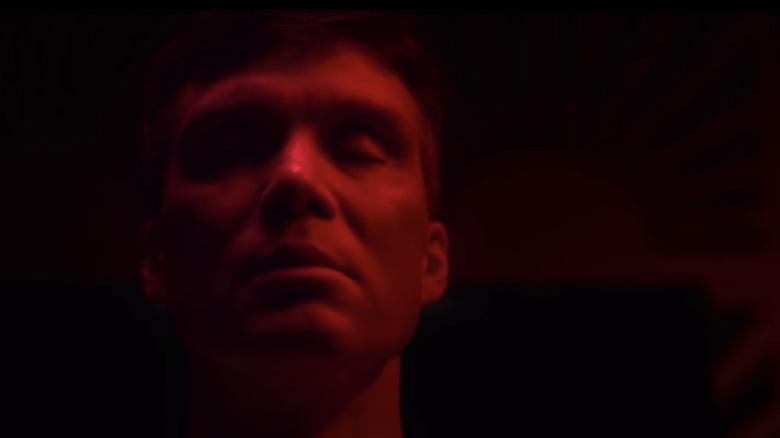Peaky Blinders Season 6 Review: The Bleak Midwinter Gets Bleaker Before The End
"Peaky Blinders" season 6, which comes to Netflix on June 10, 2022, is the end of the show — but not the end of the story. It's been almost a decade since the Cillian Murphy-led series first doffed its razorblade cap on BBC Two in the UK (where the sixth season already aired on BBC One earlier this year). The announcement of a feature film that will continue the story takes some of the edge off this final season, but the show still manages to wrangle peril and occasional pathos out of its increasingly political narrative.
Created by Steven Knight, "Peaky Blinders" started out as a show about a street gang led by Murphy's character, Tommy Shelby. Things in the Small Heath neighborhood of Birmingham, London, happened "By order of the Peaky f****** Blinders." Now, they're more likely to happen, "By order of the Birmingham Urban District Council." That's not to say the show has gotten away from itself, just that it has evolved along with its protagonist, Tommy, who remains a holdover from Peak TV's antihero boom, along with other dark dramas that have recently ended or are ending, such as "Ozark" and "Better Call Saul."
Tommy is now an Officer of the British Empire and a Member of Parliament, but you still wouldn't want to pick a bar fight with him. And it wouldn't be a season of "Peaky Blinders" if everyone made it out alive. Season 6, however, has also been affected by the real-life death of Helen McCrory, who played the Shelby family matriarch, Aunt Polly. McCrory was Murphy's co-lead, "the beating heart of the show," as he called her, and in her absence, "Peaky Blinders" shifts a bit away from the rest of its ensemble and tightens more around Tommy.
'There will be a war'
Given how long the show has been going and how long it's been since the last season hit (with no new episodes since before the pandemic in 2019), viewers might need to reorient themselves to the "Peaky Blinders" world a little before going into season 6. The BBC has a 13-minute recap of the first five seasons up, and suffice it to say, season 6 brings back at least one long-absent face and refers to plot points like the cursed sapphire from early in the series.
When we last caught up with Tommy at the end of season 5, his plan to assassinate the British fascist leader, Sir Oswald Mosley (Sam Claflin), had failed and he had put a gun to his own head. Season 6 picks up right from there and doesn't waste any time addressing Polly's fate.
Polly's son, Michael (Finn Cole), had already come into conflict with Tommy in season 5, as his new American wife, Gina (Anya Taylor-Joy), convinced him to make a play for power in the Shelby family's stateside business interests. After a Christmas time jump like the one at the beginning of season 4, this season of "Peaky Blinders" puts Michael and Tommy on a somewhat circuitous collision course on the French-Canadian bootlegging island of Miquelon. Gina is still around to vamp and swear in an American accent, but Prohibition is ending and Tommy himself is now swearing off some of his old evil ways.
Several times throughout the season, we hear Polly's admonition to Tommy about Michael repeated: "There will be a war and one of you will die, but which one, I cannot tell." Yet the narrative conspires to keep Michael and other major characters like Arthur (Paul Anderson), who is now an opium addict, rather sidelined as it follows Tommy's political maneuverings — and his ceaseless chain-smoking — in the continuing slow build to World War II.
The turpitude racehorse
One of the first images we see in "Peaky Blinders" season 6 is Tommy's face half-covered in mud. It's an image that somewhat recalls the final one of Gus Fring in "Breaking Bad," and is obviously meant to highlight Tommy's duality. Later in the season, Tommy says, "My business has two sides. Light and dark."
Murphy already played a shell-shocked soldier in Christopher Nolan's "Dunkirk," and he's set to play the father of the atomic bomb in Nolan's "Oppenheimer," but in "Peaky Blinders" season 6, his character emerges as a man caught between two World Wars and the two warring sides of his own nature. More often than not, the dark side wins, but there are signs that he may be changing as the show's musical texture softens from jangly Nick Cave tunes to funereal Thom Yorke songs.
Gina's crime-boss uncle, Jack Nelson (James Frecheville, spoken of before he's seen), tells Tommy, "Every war hero I ever met, they're just someone who wanted to get themselves killed." Tommy's sister Ada (Sophie Rundle, taking on a more prominent role this season), likewise observes how Tommy's "still looking for trouble big enough to kill" him. At times, it's as if his death wish extends beyond body and mind into the very depths of his spirit, where attachments to loved ones and any last vestige of humanity reside.
Tommy came home from World War I a different person, and he's come a long way since then, from being a street thug to a politician capable of giving rousing speeches to a room full of working-class men. However, he's also likened to the devil in season 6, and even while he poses as a respectable citizen, his criminal reputation precedes him, setting him up for quips like, "Moral turpitude. It's a good name for a racehorse."
History as horror
In "Peaky Blinders" season 6, we're no longer just keeping company with killers. We're watching them bed budding Nazis and attend fascist rallies where swastikas hang freely. Lady Diana Mitford, played by Amber Anderson, brings a socialite dash of evil to the proceedings; she's the kind of gal whose soirées involve Sieg Heil salutes, with government officials professing, "Perish Judah." Thank Yahweh for Tom Hardy, whose durable, scene-stealing Jewish gangster, Alfie Solomon, drops by again in a couple of episodes to tell stories of Irishmen arguing with Oliver Cromwell statues and remind us that "the Israelite" (meaning, Alfie) is not weak.
Alfie needs a final act for his opera, and so does Tommy. As much as Tommy might rationalize that he can fight fascists and undermine them by being among them, this and his other plans to do good come across as hollow when juxtaposed with his lapses back into remorseless criminality. How is he different from any other TV antihero who tells themselves that the means justify the needs and that there's "one last deal to be done" before they reform? As viewers, are we just gluttons for punishment, trapped in a cycle of abuse with gangsters who cry after mowing people down with appropriately named Tommy guns?
The appeal, perhaps, of shows like "Peaky Blinders" — beyond their well-acted prestige drama — is that they invite us into a hyper-reality with larger-than-life characters who reflect our own aspirational failures to do better and be better than we really are. Characters like Mosely and Mitford are based on real historical figures, but they become a canvas on which we project our fears and antipathies. When Charlene McKenna's returning IRA leader, Captain Swing, says, "We could move our people from republicanism to fascism with just a nudge," it's all the more frightening because it feels like her words could apply just as well to the here and now.
No limitations
Tommy repeatedly declares, "I have no limitations" in "Peaky Blinders" season 6, while his demeanor remains dead-eyed and unflappable in the face of horrific wrongs. It's as if the show is trying to strip away any remaining heart or hesitation from him in preparation for Churchill's "gathering storm" of World War II, where Tommy will be the lesser of two evils and where his stony qualities might be needed to fight an even greater enemy.
In one chilling scene, Tommy draws a circle on the table to illustrate how if you go far enough left and far enough right, you'll meet in the same place. In the middle of National Socialism, aka Nazism, there's him with his unspoken Romani descent. It allows some mysticism to come into play, as Tommy seems to physically channel the ghosts he's grappling and his daughter begins drawing disturbing pictures and uttering ominous gypsy words.
The premiere of "Peaky Blinders" season 6 is dedicated to McCrory's memory, and we really feel the loss of her this season, not only because of the heavyweight acting talent she brought to the table, but because Polly was maybe the only enduring character who stood as a genuine equal to Tommy. Michael Gray and Tommy Shelby on not on the same even footing as, say, Michael Pitt and Steve Buscemi's characters in the contemporaneous "Boardwalk Empire."
Season 6 gives closure to one chapter of Tommy's life and Shelby family history, but it does leave a few plot threads dangling, enough for it to feel like a conscious bridge to a movie that will act as the real series ender. In the meantime, Murphy remains a commanding presence, and "Peaky Blinders" remains watchable right up until the pseudo-end, even if its true thematic raison d'être is not always evident and it does feel as though we have to wade through a lot of muck to get a glimmer of hope for redemption.
"Peaky Blinders" season 6 drops on Netflix June 10, 2022.
